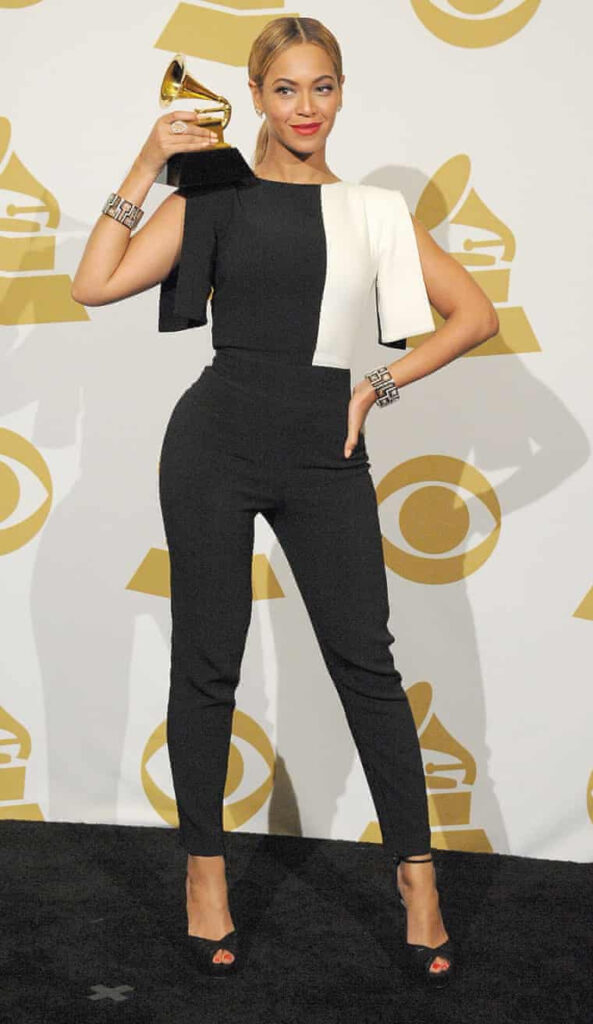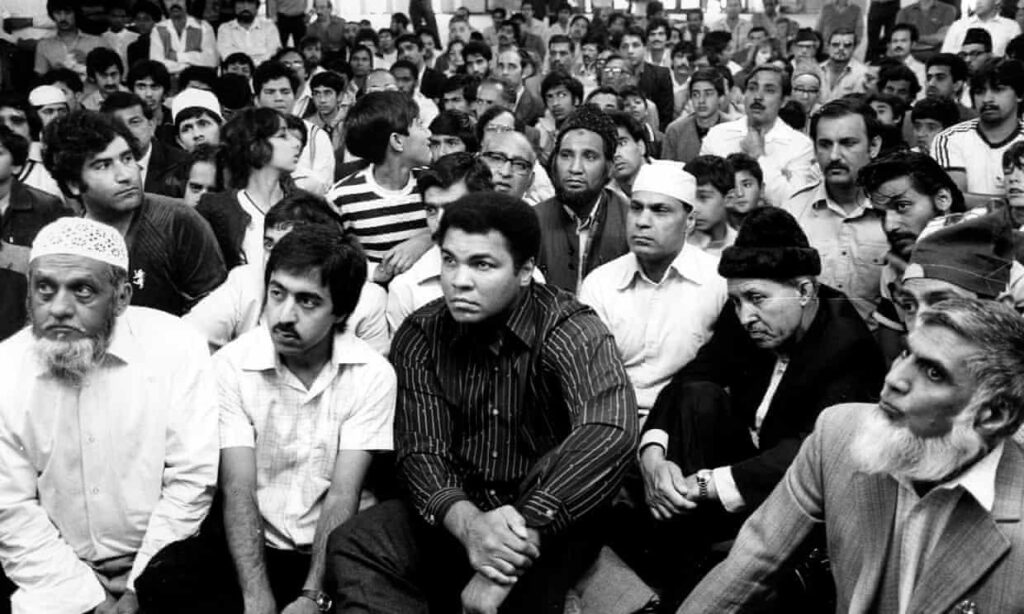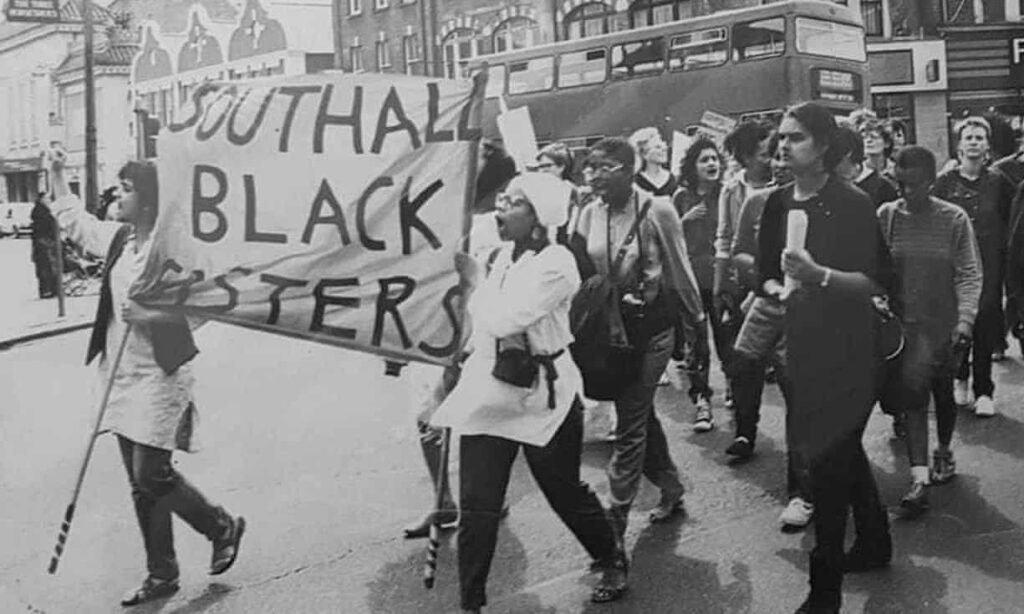Published by The Guardian News.
22 Nov 2020

Photograph: Suki Dhanda/The Observer
Designer and writer Osman Yousefzada’s jumpsuit for Beyoncé shot him to instant fame. But it’s being the son of Pakistani-Afghan migrants that shaped him most. Here, he describes his personal and political struggle against racism, and why ethnic solidarity is paramount.
Don’t go to bed!” my PR messaged from LA. It was midnight in the UK and Beyoncé was about to step out wearing one of my designs at the 2013 Grammys. The image of Beyoncé in my jumpsuit was everywhere the next day. The phone calls and emails flooded in; there were interview requests and order inquiries. With just one appearance, Beyoncé had put my emerging fashion label on the map. My appointment book was filled back-to-back for the international buying season in Paris the following month. Armed with my latest collection in two gigantic wheelie suitcases, I passed through security screening for the Eurostar train. Snaking through the immigration queue, I stepped forward to the counter with my British Passport in hand…
Before I tell you any more, there are two things you need to know about me. The first is that I am the British-born son of Pakistani-Afghan immigrants who came to the UK seeking a better life for themselves and their children. The second is that my skin tone is brown – brown enough for people throughout the course of my life to hurl a variety of racial slurs at me.
The elder kids had taught us to run away from the police, but there was nowhere I could run at immigration. Yet today was going to be different. I remember the officer was wearing a green tie and a grey suit that shone, and I wondered if it was maybe the result of ironing directly on to the fabric. But his questions snapped me out of my musings. How much money do you have in your account? When was the last time you went to the mosque? Why did you go to Pakistan? Where exactly did you visit? What do your siblings do in Birmingham? Which mosque do you go to? What line of work are you in? What book did you last read?

Photograph: Steve Granitz/WireImage
In my previous immigration interviews, the questions had been generic. I would be taken aside and I would give my responses, an officer would tap them into a computer, and eventually I would get back my passport. But this guy was different. He wanted to know my eating habits, my spending habits. I was perplexed. I asked: “Why have you detained me? It’s been nearly an hour now?” He replied that if I didn’t cooperate, he could lock me up at Paddington Green police station for 14 days under the Terrorism Act, without an arrest warrant.
I changed tack in the hope that the unlikeliness of a designer/terrorist crossover would ease suspicions. “Look at Google,” I said. “I make clothes. I just dressed Beyoncé for her win at the Grammys. And I’m going to Paris to sell my new collection.”
It didn’t work, the questions continued. He asked for my phone. I handed it over. Then he walked out of the room. Two hours passed. Had I done something wrong? Was there another Osman Yousefzada, one with unsavoury links? Without my phone, I reflected in flashbacks and memories on how I got there. This kind of experience had been reality for some of us since 9/11.
As a young child in the 1980s, I had been called a Paki, a Wog, a black bastard. In the New Labour dawn of the 90s, I was an acronym: BME, for Black Minority Ethnic. Then the Twin Towers were struck and I became the enemy within – the homegrown terrorist.
Three hours passed in the pokey grey immigration room. The person I was due to meet in Paris had probably left and there was no sign of my interrogator. The fourth hour came and I was still waiting to be released. Did I have to apologise on behalf of the nearly two billion Muslims out there for the tiny number of fundamentalists who have brought our faith into disrepute? Growing up, I wanted to be white for a while. White people were the norm. They didn’t have to apologise for their bad apples.
The immigration officer finally reappeared. My whole sales campaign and my livelihood for the following season were in jeopardy. I needed to get to Paris. Finally, after my lengthy protestations, the silence broke. “If you see anything, or if you go to your local mosque and meet anyone who may be doing something wrong, I want you to call us. I will give you a number.” I must have looked confused, the cogs turning in my head. Was he trying to recruit me? The romance of espionage flickered through my mind for a nano-second. I replied: “But I don’t really go. I haven’t been to the mosque for ages.” My phone was finally handed back, a new ticket issued and he escorted me through immigration.
Thinking back, thiswas a small, personal reminder of how the colour of my skin and my Muslim name was used to assess the level of risk I posed to society. Recently, on a much larger scale, it’s the same racial markers that sections of the media have instinctively applied to Black Lives Matter protesters, undermining the moral righteousness of their simple demand not to be killed with descriptions of the protests as “chaotic”, or focusing on “thuggery” and “looting” – two Hindustani words introduced into English by colonialists, connoisseurs in those same arts.

Photograph: Mirrorpix/Getty Images
Growing up, my identity was shaped by a sense of the injustices of colonial rule, through tales I heard from my parents and elders in the community. The migration stories of those who arrived in the UK are all different. We come from different classes, different backgrounds, different privileges and had different skill-sets. In the United States, many South Asian migrants arrived with a university degree. In the UK, quite a few migrants from Pakistan came from the peasant classes, invited to do the jobs no one wanted in textile mills and foundries.
When they arrived in England, my parents couldn’t read or write. As illiterates, they felt unworthy, bowing their heads to others, hoping their children would be able to join letters to form words in order to better navigate the system and eventually overcome the barriers they had experienced. But for now their sweat, blood and hard work was met with insults, spit and beatings at the hands of racists.
But the stories of my elder siblings, cousins and younger uncles were different. They shed their fears and chose to stand up and fight. In 1965, when they were young, Malcolm X visited Birmingham to show solidarity, invited by the Indian Workers Organisation. (He had just visited Mecca on the hajj pilgrimage.) As he stepped out on to Marshall Street in Smethwick, he said: “I have come because I am disturbed by reports that coloured people in Smethwick are being treated badly. I have heard they are being treated as the Jews were under Hitler.” That evening he spoke at Birmingham University’s Islamic Society, followed by dinner at a Bangladeshi restaurant called Chamon. Nine days later he was assassinated.
Another of America’s greats, Muhammad Ali, visited the city numerous times, and the city named a community centre after him. This wasn’t Birmingham, Alabama, this was Birmingham, England! In its central mosque, different communities – West Indians, Africans, Bangladeshis – stood shoulder to shoulder with the greatest boxer the world had seen. Our visitors were some of the leaders of the civil rights struggles in America standing together with us. They did so much to highlight and fight against the injustices suffered by their communities – and in doing so inspired other marginalised communities around the world.

Photograph: BPM Media
That included us in Britain – no less racist, no less tokenistic, no less cruel than the United States as an offshore centre for the profits earned from slavery and colonialism. What rose out of this was a comradeship across black and brown ethnic lines, solidarity across ethnic groups, a coalition of young men and women that fell under the umbrella of “political blackness”. This position was radically different from the positions of their parents, who mostly preferred to keep their heads down. These were young people inspired by Black Power and the freedom movements taking place around the colonised world. It didn’t matter if you were from the West Indies or Pakistan or Bangladesh. Political blackness was a united front against racism, an effort to protest the injustices being inflicted on all non-white groups. Political blackness was the colour of politics, not skin.
Recently, I asked my cousin, who was active in the Asian Youth Movements (AYM) in the north of England in the 1980s, if he still considered himself black. He replied, “We are still black.” I left wondering how a 60-year-old British Pakistani man, living a very simple, modest life in a deprived Asian, predominately Muslim part of Birmingham, considered himself to be black. He wasn’t saying it to appropriate another culture, to impress anyone, or to jump on a bandwagon. It was his personal interpretation of his own lived experience. For him, black simply meant non-white.
Along with Paki, he had been called black, or more accurately black bastard, as a term of abuse many times. He had arrived in the UK a few years before Enoch Powell’s Rivers of Blood address, a toxic, racist speech delivered a mile from our Birmingham house. Powell’s words – “In this country in 15 or 20 years’ time the black man will have the whip hand over the white man” – incited and gave strength to racism. White supremacists would come “Paki bashing” as a regular Sunday activity. My cousin once witnessed the aftermath of a terrible beating of one of our family members, an uncle who never left his home again. It was under the banner of blackness, the universal “other”, that marginalised communities got together to protect themselves and fight back. Political blackness was a vehicle of unity and change.
Language changes over the course of time and words take on new meanings. When Malcolm X said: “There is a new type of negro, who calls himself black,” he was noting a new insistence on self-definition, of taking control and being able to label yourself and your own struggle. Black was strong and proud.
Leila Hassan, an inner member of the British Black Panthers, told me that when the BBP was launched, in 1968, black was a political statement. There were five prominent south Asian members of the British black panthers: Mala Sen, Farrukh Dhondy, Sunit Chopra, Vivan Sundaram and also the artist Rasheed Araeen. It included everyone and all forms of struggle against oppression at that time: Palestinians, Asians, West Indians. “To be honest, I didn’t really comprehend the term until recently,” she told me, “but it appears that individuality is far more of an important factor today, or what they call sectionality. I am this or you’re that, rather than a collective common struggle against an oppressor.”

Photograph: Neil Kenlock Archive
Perhaps she was referring to the fact that solidarity across ethnic lines soon began to crumble. I went to university during the 1990s, when Tony Blair’s New Labour party clinched a landslide victory and Cool Britannia was in full swing. This is when I started to see representations of myself on TV. Goodness Gracious Me challenged stereotypes about Asians being submissive. It was the decade that Arundhati Roy’s The God of Small Things won the Booker prize, Ayub Khan Din’s East is East won the Bafta for best film, and the indie song A Brimful of Asha made it to No 1. Bollywood culture entered the mainstream – henna tattoos, bindis and Hindu goddess T-shirts became available in upmarket designer stores. Yoga centres popped up everywhere as meccas for white, able-bodied, middle-class women. At that time it didn’t seem like appropriation – it seemed that we were being accepted and our culture was being embraced. We were sharing, we were assimilating, and we could just about get our foot through the door. We were having our moment. Suddenly, Indians, Pakistanis and Bangladeshis had become the largest minority group in the country and certain elements within the community, such as Asian businessmen and some community leaders, didn’t want to see themselves as being part of the black coalition any more. This is when the A in BME was added. BAME. Black Asian Minority Ethnic. For many, “political blackness” disappeared.
But the superficial romance of white acceptance of Asian culture proved to be short-lived. While some Asians straddled the ladder of model minority, others fell towards the bottom of the heap after 9/11.
I asked Leila: “If political blackness is dead, do we need another umbrella term to harness our unity today? To keep this momentum going? To learn from the past, when unity fragmented along identity lines and racialised communities found themselves competing against one another for government resources?” Like colonialism, the system had divided us again. Those who had fought against the system became part of it.
She said she thought it was up to the current activists to determine a term for a common struggle against oppression. So, can that term still be “politically black”? Some people think so. Writer Rahila Gupta, a member of the Southall Black Sisters, a regional collective established in 1979 to support African, Caribbean and Asian women who had experienced gender-based violence, still describes herself as a black feminist. It has been her identity since the late 1970s. To her, blackness is a politics of solidarity. The word black gave her and other activists an inclusive identity, and allowed for a powerful politics that is expansive. To introduce herself as black, allowed her to combat colourism, and any anti-black sentiments that she came across in her communities. She says it has never been about denying cultural differences between ethnicities, or erasing distinctiveness, or appropriating each other’s culture. It wasn’t a term to flatten our difference; it was a term that brought us together, allowing minorities to come together to fight racism.

Photograph: Courtesy of Southall Black Sisters
Political blackness is a unique part of the British civil rights struggle and shows what diverse racialised groups were able to achieve together. There are still individuals and groups of people who identify themselves as politically black, and who have invested a lifetime of work into these politics. We still need to honour their struggles and the racism they faced, and fought against. It is also on their backs that the next generation stands. Perhaps there is something that can be salvaged from it, and the current conversation of its demise is an intergenerational struggle of semantics. I wondered where I stood in this conversation, for me the colour of my own politics is about solidarity, inclusion and a collective voice without the need to marginalise other voices. Joshua Virasami of BLM UK once told me for the downtrodden masses, solidarity is our superpower and we ignore it at our own risk. These words stuck with me.
If political blackness is dead, then maybe we need a new set of ideas with its own terminology, a language that allows us to come together to fight, especially as often our struggles have more in common than not. A term that doesn’t divide us or fragment us, that doesn’t pitch us against one another fighting for scraps of regenerational grants from an elitist system built on race and class privilege. Together, we are stronger!
Click here to view this article on the Guardian website.
